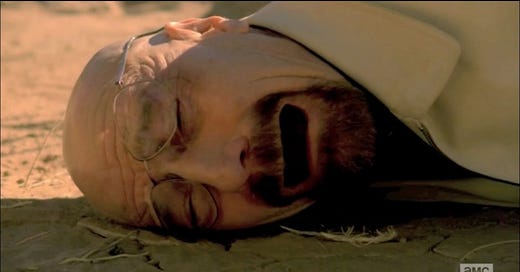If you missed Part I of this series on the poetry of Breaking Bad, you can check out the first post here:
Whenever we reference an older work of art within the confines of a newer one, we’re admitting something: the past has something to tell us about the present. This is a pretty broad generalization, but the gist of the reference game is this: human beings have been here before. And when Breaking Bad decided to reference Percy Shelley’s 1818 poem “Ozymandias,” the point the writers wanted to make was that nothing lasts, death comes for us all, and power, ultimately, is a fleeting fantasy.
Heisenberg is Ozymandias
The episode, and the show more broadly, invites viewers to consider in which ways power both lasts and doesn’t.
“Ozymandias” is one of Shelley’s best-known works, and Breaking Bad merely launched its reputation further into orbit. Much has been written about what the poem itself means, how it relates to the show’s themes, and why the show’s writers elected to use it.
Including a 200-year-old poem on one of the most critically and commercially successful television shows of all time demonstrates poetry’s relevance.
The point I’d like to make about its inclusion on the show goes something like this: yay poetry. Yay poetry on television! Why? Because too often poetry, especially poetry as old as Shelley’s, is stereotyped as dusty and best relegated to history. And while championing the work of living poets is another incredibly important project, including a 200-year-old poem on one of the most critically and commercially successful television shows of all time helps raise poetry’s visibility. But most importantly, it demonstrates poetry’s relevance.
That a poem like this could speak to a modern situation like that of Walter White is proof of the art form’s power. This is interesting, because the poem itself suggests that oppressive power like that of a dictator or kingpin can only ever be fleeting.
The third-to-last episode of the show, (Season 5, Episode 14) is titled “Ozymandias” to signal that everything Walt has will crumble.
The Backstory
We have Canadian actor, writer, and producer Moira Walley-Beckett to thank for introducing show creator Vince Gilligan to the poem. Walley-Beckett had wanted to use it in the show for some time before actually doing so. In fact, she had attempted to use the poem in a play she penned ten years prior to the Breaking Bad episode bearing the poem’s name but hadn’t. In working on the show, she realized she had found an even better correlation.
More than just an episode title, the showrunners embraced the poem as a kind of through-line for the entire season, and because it was the final season, as a through-line for the whole show in hindsight. Bryan Cranston recited the poem in its entirety in this chillingly good trailer for the show in 2013:
Of this recording experience, Cranston had this to say:
It was a surprise. I was not familiar with the poem. And I’m glad that they introduced it to me. It escaped me, that poem. But boy, it was just so apropos.
Agreed. This is the text of the poem in its entirety:
OZYMANDIAS
I met a traveller from an antique land,
Who said—“Two vast and trunkless legs of stone
Stand in the desert. . . . Near them, on the sand,
Half sunk a shattered visage lies, whose frown,
And wrinkled lip, and sneer of cold command,
Tell that its sculptor well those passions read
Which yet survive, stamped on these lifeless things,
The hand that mocked them, and the heart that fed;
And on the pedestal, these words appear:
My name is Ozymandias, King of Kings;
Look on my Works, ye Mighty, and despair!
Nothing beside remains. Round the decay
Of that colossal Wreck, boundless and bare
The lone and level sands stretch far away.”
—Percy Bysshe ShelleyWritten in iambic pentameter, this poem is also a sonnet. As I’ve discussed in the past, sonnets are excellent for inquiry, for setting up and then changing an expectation. The odd number of stressed syllables in each line keeps the work from sounding too sing-songy and gives it the ring of actual speech, though not as much as unrhymed iambic pentameter, or blank verse, does.
The octave, or first eight lines, tells the story of what the fallen statue of Ozymandias looked like, and contrasts pathetic images with the arrogant and boastful inscription on the statue’s pedestal in the sestet, or final six lines. The poem says, essentially, “tough talk for a dead guy whose statue and empire have crumbled to dust.”
There are three people in this poem: the speaker (“I”), the “traveller,” and Ozymandias (otherwise known as Pharaoh Rameses II, the most powerful pharaoh during Ancient Egypt’s most powerful period) the King of Kings himself. In the poem, the speaker meets the traveller, who has seen the statue of a once-great ruler, and points out that today, all around it is nothing but ruin. Sound familiar? It did to Moira Walley-Beckett, too.
The showrunners really, uh, ran with the idea. Superfans have even pointed out that Walt’s faceplant into the dirt even looks like a collapsed statue (see the header image above).
At the outset of Breaking Bad, Walter White was simply a middle-class chemistry teacher with terminal cancer, trying to make money to leave behind for his family. But at a certain point in his journey to becoming a meth kingpin, his goals changed. He may not have been able to admit this to himself at first, but power, once he tried it on, felt really, really good.
But that kind of domineering power can’t last: just ask Rameses II. While Shelley may have been thinking of Napoleon or George IV when he penned the poem, when we read the poem and consider it in modern contexts, it’s even easier to see its applicability to all structures of power and brutality.






pusslay